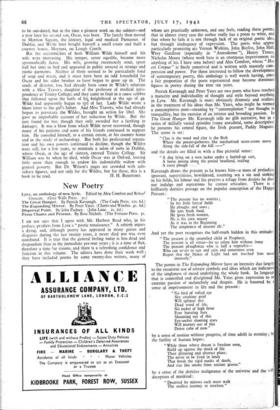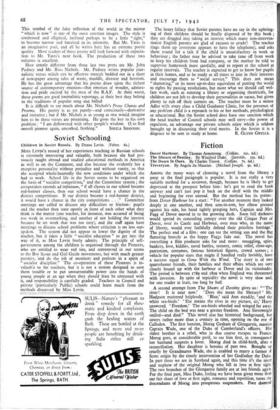New Poetry
The Great Hunger. By Patrick Kavanagh. (The Coala Press. 125. 6d.) The Expanding Mirror. By Peter Yates. (Chatto and Windus. 45. 6d.) Dispersal Point. By John Pudney. (John Lane. as. 6d.)
Prose Chants and Proems. By Ross Nichols. (The Fortune Press. 5s.
I AM not sure that I agree with Mr. Herbert Read who, in his preface, practices from Lyra a "poetic renaissance." A rebirth argues a dying, and, although poetry has appeared in many guises and disguises during the last twenty years, it never died nor was even moribund. It is true that the general feeling today is less dead and despondent than in the immediate pre-war years ; it is a time of flux, therefore a time for visions, and there is a refreshing confidence and lyricism in this volume. The editors have done their work well ; they have included poems by some twenty-five writers, many of whom are practically unknown, and one feels, reading these poems, that in almost every case the author really has a poem to write, and that where he fails it is not through lack of an original poetic idea, but through inadequacy of expression. The poets who appear particularly promising are Vernon Watkins, John Bayliss, John Hall, Wrey Gardiner (especially in " Astroderme "), Henry Treece, Nicholas Moore (whose work here is an enormous improvement on anything of his I have seen before) and Alex Comfort, whose "Hoc. est Corpus" is finely conceived and is written with masterly com- pression and power. For those interested to follow the development of contemporary poetry, this anthology is well worth having, since a fair proportion of the poets represented may become dominant figures in poetry during the next ten years.
Patrick Kavanagh and Peter Yates are two poets who have reached a maturity and individuality of thought and style beyond anything in Lyra. Mr. Kavanagh is more obviously dramatic and realistic in the treatment of his ideas than Mr. Yates, who might be termed a contemplative poet—meaning by " contemplation " not thought in tranquillity, but the exercise of an intense and brooding passion. In The Great Hunger Mr. Kavanagh tells no glib narrative, but in a series of skilfully varied episodes (some anecdotal, some descriptive) he presents his central figure, the Irish peasant, Paddy Maguire. The scene is set :
"Clay is the word and clay is the flesh
Where the potato-gatherers like mechanised scare-crows move Along the side-fall of the hill —" and the details are filled in with a fine pictorial sense: "A dog lying on a torn jacket under a heeled-up cart, A horse nosing along the posied headland, trailing A rusty plough . . . '
Kavanagh draws the peasant as he knows him—a mass of prejudice, ignorant, superstitious, bewildered, counting sex a sin and seeking in his fields, his labour and his prayers a refuge from desires he dare not indulge and aspirations he cannot articulate. There is a brilliantly derisive passage on the popular conception of the Happy Peasant : "The peasant has no worries ;
In his little lyrical fields He ploughs and sows ;
He eats fresh food,
He lpves fresh women, He is his own master As it was in the Beginning The simpleness of peasant life."
And yet the poet recognises the half-truth hidden in this attitude:
"The peasant is the unspoiled child ot Prophecy, The peasant is all virtue—let us salute him without irony
The peasant ploughman who is half a vegetable—
Who can re-act to sun and rain and sometimes even
Regret that the Make' of Light had not touched him more
intensely."
The poems in The Expanding Mirror have an intensity due largely to the recurrent use of certain symbols and ideas which are indicative of the singleness of mood underlying the whole book. In language that is controlled and disciplined Mr. Yates gives expression to an extreme passion of melancholy and despair. He is haunted by 1 sense of imprisonment in life and the present : No bird of voiced eye Sky crashing grief Will splinter this Dead word of life, No rocket of high fever Ever bursting bars Mounting out of this Eye-socket shooting stars
Will journey out of this Dense cube of now."
by a sense of motion without progress, of time adrift in eternity ; by the futility of human hopes :
"While those whore dream is freedom soon,
Build up against the shock of life
Their glittering and abstract plans: The never to be lived in lands That break the rigid masks of death, And rise like smoke from ancient graves."
by a sense of the derisive malignance of the universe deception of mankind : "Deceived by mirrors each must walk The endless journey to nowhere." and the self- This symbol of the false reflection of the world in the mirror "which is now" is one of the MOit constant images. The style is condensed and elliptical, inclined perhaps to be a little "tight," to become narrow and fanatical in its intensity. But Mr. Yates is an imaginative poet, and all he writes here has an extreme poetic quality. Most readers of these poems will look forward with expecta- tion to Mr. Yates's next book. The production - of these two volumes is excellent.
How utterly different from these last two poets are Mr. John Pudney and Mr. Ross Nichols. Mr. Pudney writes popular jour- nalistic verses which can be effective enough bedded out in a sheet of newspaper among tales of waste, muddle, disaster and heroism. He has the great advantage that his poems draw upon the richest source of contemporary emotion—that emotion of wonder, admira- tion and pride excited by the men of the R.A.F. At their worst, these poems are good journalistic reportage, at their best they belong to the traditions of popular song arm ballad.
It is difficult to say much about Mr. Nichols's Prose Chants and Proems. His poetry is as yet purely—and consciously—derivative and imitative ; but if Mr. Nichols is as young as one would imagine him to be these verses are promising. He gives the key to his own problem: "I am deflowered with other people's wisdom. 0. to find oneself pioneer again, uncorked, frothing." SHEILA SHANNON.



























 Previous page
Previous page